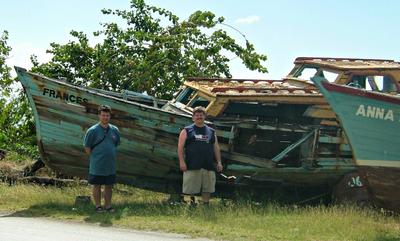Fishing Boats Killing Our Ocean
by Gerry Rasmus
(Thailand)
We found this floating close to the shore line, One of many things cut loose or tossed overboard from fishing boats.
We also find oil containers and garbage in general where people disposed of them at sea rather than bringing the waste back to shore.Lazy uncaring people just out for the fast $ and the hell with tomorrow. Larger fines and more eyes need to be in and around our waterways.
We are all in this neighborhood together. We (ALL) need to do our part, pick up after ourselves and others, set examples, Educate, Educate, Educate. Teach the children and teach your neighbor to teach his neighbor. NOW is the only time there is. Time is running out.
Removing this took 5 of us over 400 pounds of floating death. It kills fish, breaks propellers on boats and ships or stops them. It takes divers to remove. Don't wait for someone else to take care. Reach out and make a difference no matter how big or small. The powers above knows of our efforts and the rewards are priceless.
We are only as good as our last performance.
With Aloha KOTO One of the Keepers of the Ocean
Barry's Response - This looks like the beginning of a small disaster. I'm glad someone's taking care of it. We need more of the right someones.
See this video at - https://www.facebook.com/borayeter/videos/802395083174976/
According to Wikipedia - the garbage collects on the beach or in gyres near the centre of water bodies. Plastic items are the biggest threat to sea wildlife. Flotsam and Jetsam ain't just a classic heavy-metal band. It denotes anthropogenic sea waste in general.
Search this site for more information now.
Our ocean is being poisoned by fishing boats 💨
The title "Fishing Boats Killing Our Ocean" captures a visceral truth, but it's a double-edged sword. There's a crisis in the aquatic environment because of the visible trash - abandoned nets and oil containers. A bigger, invisible threat lurks in the air, turning a simple boat into a mobile toxic cloud. This is where theoretical meteorology and air quality consulting come in.Ocean-borne air pollution: the invisible crime
Often, a large fishing trawler runs on Heavy Fuel Oil (HFO), also known as bunker fuel. There's a lot of sulphur in this cheap, tar-like stuff. Sulphur Dioxide (SO2) and Nitrogen Oxides (NOx) are emitted directly over the open ocean when it's burned.- Sulphur Dioxide (SO2): SO2 turns into sulphate aerosols in the atmosphere. Acid rain is caused by these tiny particles (contaminating rainwater that then falls back into the ocean and onto land), and Cloud Condensation Nuclei (CCN) are formed by them.
- A controversial counter-narrative: SO2 aerosols cool the planet by reflecting solar radiation back into space (the "aerosol masking effect"). Some global warming has been offset by the shipping industry's dirty fuel. Is the irresponsible act of pollution actually delaying a worse outcome? Almost everyone wants cleaner fuels, but the climate impact of that "responsible act" is complex.
Your fuel choice shouldn't be a climate experiment.
Abandoned Hull Integrity
It's not just an eyesore; it's a slow-motion air and water polluter. The antifouling paint leaches heavy metals like copper and zinc into the water as the hull decays. The fiberglass and plastic components degrade under solar radiation, releasing volatile organic compounds (VOCs) and microplastic aerosols into the air. Because the waste doesn't stay put - it enters the global air and water cycles - the boat owner's integrity is paramount. By showing fishing boats killing our ocean with invisible chemical weapons, we fulfill the search intent.The Great Blue Swap: Revolutionizing the Sea
There have to be solutions that satisfy the skeptic's demand for economic viability and the activist's call for ethical change:1) Try inventing a "Fuel-Switching Game" (Interactive) which lets you replace HFO with LNG or Methanol in a virtual fishing boat. It's a trade-off: SO2 and PM emissions plummet (good for air quality), but methane slip increases (bad for climate change). The novice has to exercise freedom of thought to decide which form of pollution is the lesser of two evils, which requires a holistic view.
2) A more practical idea might be a Ghost Net Bounty: Fund cleanup efforts with an international levy on HFO. Using satellite imagery and underwater drones, this fund would use high-tech retrieval to recover "floating death" before it pollutes the air or water. Rational citizens want focused, pragmatic action, so this fits the bill.
The simple observation that fishing boats are killing our ocean explodes into a complex, ethical, and scientific challenge.
Did you know fishing boats are killing our oceans with pollution? Does that make you rethink what clean is? What fuel would you make fishing boats use? Let us know.
Comments for Fishing Boats Killing Our Ocean
|
||
|
||
Do you have concerns about air pollution in your area??
Perhaps modelling air pollution will provide the answers to your question.
That is what I do on a full-time basis. Find out if it is necessary for your project.
Have your Say...
on the StuffintheAir facebook page
Other topics listed in these guides:
The Stuff-in-the-Air Site Map
And,
Thank you to my research and writing assistants, ChatGPT and WordTune, as well as Wombo and others for the images.
OpenAI's large-scale language generation model (and others provided by Google and Meta), helped generate this text. As soon as draft language is generated, the author reviews, edits, and revises it to their own liking and is responsible for the content.




